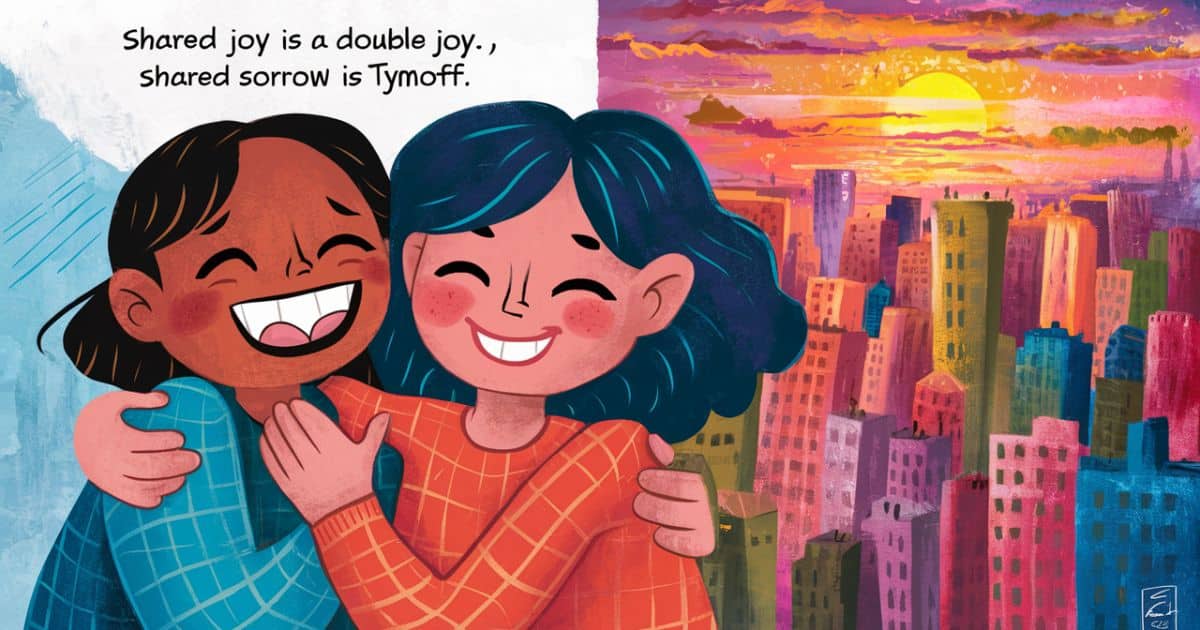Have you ever experienced a moment of pure elation – scoring the winning goal, acing a crucial exam, or witnessing the birth of a child? Now imagine sharing that joyous feeling with loved ones around you, their faces beaming with excitement and pride. In that instant, your happiness seems to multiply, becoming even more intense and meaningful. Conversely, consider a time of deep sorrow, such as the loss of a dear friend or a devastating setback. While the pain may have initially felt unbearable, the warm embrace and empathetic ears of those who care likely provided immense comfort, lightening the emotional burden.
This profound phenomenon speaks to the core of human nature – the innate drive to share our emotions, both positive and negative, with others. When we share joy, it becomes a double joy, amplified by the collective celebration and connection. And when we share sorrow, it becomes halved, as the weight is distributed across supportive shoulders. Exploring the psychological and social benefits of shared emotions can lead to stronger bonds, improved well-being, and a deeper appreciation for the human experience.
“Shared joy is a double joy; shared sorrow is half a sorrow.” – Swedish Proverb
The Science Behind Shared Emotions
The impact of shared emotions is not merely anecdotal; it is rooted in the intricate workings of our brains and biochemistry. Mirror neurons, a specialized group of cells in the premotor cortex and inferior parietal cortex, play a crucial role in this phenomenon. These neurons fire not only when we perform an action or experience an emotion ourselves but also when we observe someone else doing the same. This neurological mirroring allows us to empathize and resonate with others’ emotional states, creating a shared experience.
Moreover, the hormone oxytocin, often referred to as the “love hormone,” is released in significant quantities during positive social interactions and bonding experiences. Oxytocin has been linked to increased trust, empathy, and a heightened sense of connection, further amplifying the effects of shared emotions.
Numerous studies have reinforced the benefits of shared joy, demonstrating its ability to increase positive affect, life satisfaction, and overall well-being. For instance, research published in the Journal of Happiness Studies found that individuals who frequently shared positive events with others reported higher levels of happiness and better relationship quality.
On the other hand, shared sorrow has been shown to provide a valuable source of empathy, perspective, and coping mechanisms. A study by the American Psychological Association revealed that individuals who shared their grief with supportive loved ones experienced reduced anxiety, depression, and physiological stress levels compared to those who bottled up their emotions.
Doubling Your Joy through Connection

The power of shared joy lies in its ability to amplify positive emotions and create lasting, meaningful connections. Consider the overwhelming sense of elation that washes over a couple as they exchange vows on their wedding day, surrounded by loved ones beaming with joy and pride. Or the collective euphoria that erupts in a stadium when the home team scores the winning goal, as fans embrace and cheer in unison.
These moments hold a special place in our hearts because we experienced them alongside others who shared in our excitement, validating and magnifying our emotions. By actively sharing positive experiences, we not only strengthen our relationships but also cultivate a deeper sense of gratitude and appreciation for the joys in our lives.
Ways to Double Your Joy:
- Participate in Group Activities: Engage in shared hobbies, sports, or creative pursuits that bring people together in a spirit of camaraderie and accomplishment.
- Host Celebrations and Gatherings: Mark special occasions, milestones, and achievements by inviting loved ones to join in the festivities, creating a collective experience of joy.
- Practice Storytelling: Share uplifting stories, anecdotes, and memories with others, allowing them to vicariously experience the positive emotions and reinforcing the bonds between you.
Read This Post: The Tortured Poets Department
Cutting Your Sorrows in Half
Just as shared joy amplifies positive emotions, shared sorrow has the remarkable ability to alleviate negative emotions and provide comfort during difficult times. Consider the profound impact of receiving a supportive embrace or a listening ear from a loved one after experiencing a devastating loss or setback. In that moment, the weight of sorrow seems to lift, if only slightly, as the burden is shared and validated by those who care.
Numerous examples illustrate the healing power of shared sorrow, from support groups for individuals battling illness or addiction to communities coming together in the aftermath of natural disasters or tragedies. By openly sharing our struggles and vulnerabilities, we not only receive empathy and understanding but also gain valuable perspectives and coping strategies from those who have faced similar challenges.
Supportive Sharing Strategies:
- Practice Vulnerability: Create safe spaces where individuals feel comfortable expressing their emotions without fear of judgment or criticism.
- Cultivate Active Listening: Offer your undivided attention and empathy when others share their sorrows, validating their feelings and providing a supportive presence.
- Encourage Empathy: Strive to understand and acknowledge the depth of another’s pain, offering compassion and a willingness to walk alongside them on their journey.
“The greatest healing therapy is friendship and love.” – Hubert H. Humphrey
Building a Culture of Shared Emotions

While the benefits of shared emotions are clear, creating an environment where people feel comfortable expressing and sharing their feelings can be a challenge. Many individuals may feel hesitant or reluctant to open up due to societal norms, fears of judgment, or a lack of trust. However, by intentionally building a culture that prioritizes emotional sharing, we can break down these barriers and foster deeper connections, resilience, and overall well-being.
Organizations and communities that actively encourage open dialogues, check-ins, and group activities centered around sharing emotions have reported positive outcomes, such as increased employee engagement, improved teamwork, and a stronger sense of belonging. Companies like Pixar and Google have implemented programs and initiatives that promote vulnerability and emotional sharing among their teams, recognizing the value it brings to both individual and organizational growth.
Overcoming Barriers to Sharing
Despite the numerous benefits, many individuals still struggle to share their emotions openly. Here are some common roadblocks and strategies to overcome them:
- Fear of Judgment: Create safe, supportive environments where vulnerability is celebrated, not criticized. Establish clear guidelines for respectful communication and confidentiality.
- Pride and Self-Reliance: Reframe the notion that sharing emotions is a sign of strength, not weakness. Highlight the courage and resilience required to be vulnerable with others.
- Lack of Trust: Build trust gradually through consistent, authentic interactions. Lead by example, sharing your own emotions first to encourage reciprocity.
By addressing these barriers head-on and fostering a culture of emotional sharing, we can unlock the transformative power of shared emotions and cultivate deeper, more meaningful connections with those around us.
Conclusion
In a world often dominated by individualism and emotional suppression, the act of sharing our emotions – both joyous and sorrowful – stands as a profound reminder of our innate human need for connection and support. Through the lens of shared emotions, we can truly appreciate the adage, “Shared joy is a double joy; shared sorrow is half a sorrow.”
By embracing the scientific and psychological benefits of shared emotions, we open ourselves up to a wealth of opportunities for personal growth, resilience, and deeper relationships. Whether it’s amplifying the joy of achievements and milestones or alleviating the weight of struggles and hardships, the simple act of sharing our feelings with others holds the power to transform our experiences and enrich our lives.

I’m passionate electric scooter enthusiast and the voice behind this blog. I’m here to share my expertise and insights with you. From in-depth reviews to problem-solving guides, my goal is to help you make the most of your electric scooter experience.








![Gomyfinance.com Invest: I Made $5,000 in My First Month [Real Results 2025]](https://electopolo.com/wp-content/uploads/2025/05/Gomyfinance.com-Invest-I-Made-5000-in-My-First-Month-Real-Results-2025-150x150.jpg)


